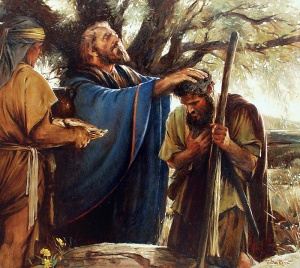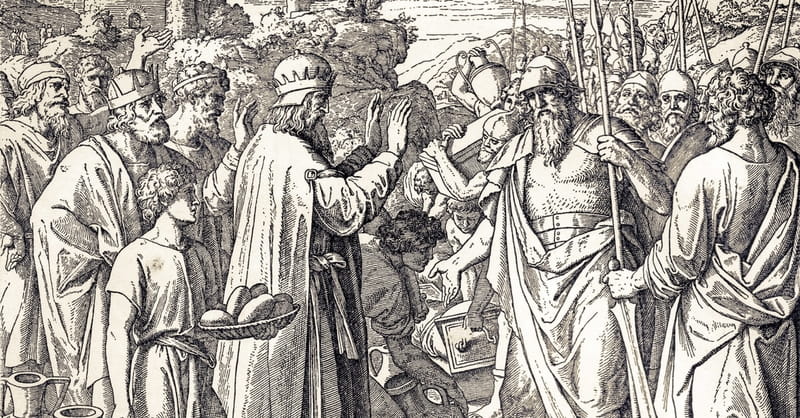It is exhilarating to imagine that there is a divine being who serves the purpose of advocacy between God and His subjects. This “being” without doubts has the very form of God because the life of God is in him. He has direct access to God, dwells in His bosom, in other words, He sees Him and advocate on behalf of His subjects. He is Himself subjected to God because He was appointed by God and has always been from the very beginning with God; of such a personage is Melchizedek who was the priest of the most high God (Genesis 14:18).
Apparently, it shouldn’t be speculative to think that, this enigmatic being has always been with the most High from the very beginning. He was before Abraham and has always served as a Priest of the most high who stood in the gap for the patriarchs that were before Abraham.
Before the Mosaic Law was given, Melchizedek was not just a Priest here on earth; He was a Priest also in heaven. Interestingly He was a major personage among the mighty, of whom the Psalmist spoke of in Psalm 82:1;
God standeth in the congregation of the mighty; he judgeth among the gods.
The writer of the book of Hebrews described Melchizedek as the King of righteousness and peace. The use of the word “king” places this personage in the position of authority. Consequently, as the King of righteousness, He has the God-given authority to judge in the stead of the most high; accurately and divinely placing what’s good as being good and defining evil as what it is. As the King of peace, He has the God-given authority to stand in the gap as the “peaceful advocate” between the most High and His subjects. See Hebrews 7:2-3;
“2 To whom also Abraham gave a tenth part of all; first being by interpretation King of righteousness, and after that also King of Salem, which is, King of peace;
3 Without father, without mother, without descent, having neither beginning of days, nor end of life; but made like unto the Son of God; abideth a priest continually.”
This mysterious being as we can see from verse 2 of the scriptures above was not biologically given birth to and as such has no biological descent. In other words, he has no earthly father or mother. These facts readily debunk the ideology which suggests that Melchizedek was a king here on earth and has an earthly empire called Salem.
He has no beginning of days and no end of life. It has been buttressed above that the life of this personage is the very life of God which has no beginning or end of days. He has always been with the most High as stated above and abides with Him forever. So it then appears that He who had no beginning of days has always been with the ancient of days. Melchizedek is part of God’s consciousness.
It is interesting to note that the presence of Melchizedek in the court of the most high readily defines the immeasurability of the righteousness of God. In other words, Melchizedek is a faithful witness of the righteous judgment of God. He (Melchizedek) knows that the most high is a righteous judge; consequently, all He ever learned about judgments were learned from the most high. The point here is that, unlike a power-drunk tyrant, who would execute judgment to his own pleasing, God is so righteous that He had to set up for Himself or make as part of His own consciousness a witness to behold His righteous judgments on His subjects be they spirits or mortals.
There is however something unique about this personage, in that He was made like unto the Son of God. In other words, He has the sort of relationship which Jesus Christ has with God. So this implies that the most high is a Father to Him. Consequently, the son can only speak the words of His Father and execute the judgment of His Father (John 5:30). So there are certain parallels between Melchizedek and Jesus Christ. We shall shed more light on this in chapter five.
Note also that the writer of the book of Hebrews also described Melchizedek as a great man. See Hebrews 7:4;
Now consider how great this man was, unto whom even the patriarch Abraham gave the tenth of the spoils.
A fact that must be appreciated is that the Priestly Order which the man Melchizedek occupied is the highest priestly order there is. A priest in this order has direct access to the most high and can advocate on behalf of His subjects. He is the one between the most High and His subjects. It suffices to state here that, Melchizedek is the word of God; a mouthpiece that conveys the mind of God in words to His subjects.
Remember that Melchizedek has no father or mother, no descent, no beginning of days and no end of life. Nevertheless, we have ascribed to Him a human nature which makes Him physically visible to anyone whom the most High sends Him to. The catch here is that Melchizedek has the potency to present Himself in duo-form.
Whenever He is sent to execute a priestly function here on earth He will appear as a physical being and whenever He is going back to the tabernacle of the most high, He transforms into a spiritual being. His tabernacle is with the most high; remember the words of the Psalmist about the tabernacle of God. See Psalm 76:2;
1 In Judah is God known: his name is great in Israel.
2 In Salem also is his tabernacle, and his dwelling place in Zion.
Aside from His priestly office as the priest of the most High, Melchizedek is also King in Salem while the most High is His God. We should not find it strange that Melchizedek could present Himself in duo form viz as a human being and as a spiritual being. The scriptures are replete with accounts that validate this fact.
The Significance of Melchizedek’s Meeting with Abraham
Remember that the most High had promised to make Abraham a great nation in whom all the nations of the earth shall be blessed. Upon this premise, it becomes incumbent that the priest of the most high meets with him. The meeting which Melchizedek is to have with Abraham is of an inestimable value, because it was pre-arranged by the most High.
It is interesting to point out here that Melchizedek did not come to Abraham empty-handed. He brought bread and wine along. See Genesis 14:18;
And Melchizedek king of Salem brought forth bread and wine: and he was the priest of the most High God.
The bread and the wine which Melchizedek brought to Abraham was significantly meant to serve as an ensign of God’s plan for the redemption of man. It was a symbol indicating the gospel of Christ.
It should be noted also that David according to whose seed, Christ came was still in the loins of Abraham. So the bread and wine is not just a symbol of the Eucharist, but of something much deeper. It is the symbol of the redemption of man. Let’s see what Christ Himself later revealed to us about the significance of the bread and the wine. Matthew 26:26-28;
26 And as they were eating, Jesus took bread, and blessed it, and brake it, and gave it to the disciples, and said, Take, eat; this is my body.
27 And he took the cup, and gave thanks, and gave it to them, saying, Drink ye all of it;
28 For this is my blood of the new testament, which is shed for many for the remission of sins.
Apparently, the bread signifies the body of Christ while the wine signifies His blood of the New Testament that was shed for the remission of sins. This then suggests that the bread and the wine which Melchizedek brought to Abram serves as a prophetic annunciation of the coming of the Messiah by whom the nations of the earth will be blessed in Abraham. This was God’s declaration to Abraham “…and in thee shall all families of the earth be blessed”. Apostle Paul described this word of promise to Abraham as the gospel. Galatians 3:8;
And the scripture, foreseeing that God would justify the heathen through faith, preached before the gospel unto

Abraham, saying, In thee shall all nations be blessed.
After the breaking of the bread and the drinking of the wine, Melchizedek went ahead and blessed Abram. See Genesis 14:19;
“And he blessed him, and said, Blessed be Abram of the most high God, possessor of heaven and earth…”
It should be brought back to mind, that the words of blessings which God had pronounced upon Abram were still yet to come to fulfillment. The word of the Lord to him was “I will…” the word “will” is used in the future tense. So the blessing has not been ordained to be because it was still a word of promise. Consequently, a major reason amongst others why Melchizedek met with Abram was to ordain the blessings which God had pronounced on him. This is because He was the Priest of the most high. Let’s take a look at the scriptures. Genesis 14:19;
“And he blessed him, and said, Blessed be Abram of the most high God, possessor of heaven and earth…”
A careful examination of the phrase “blessed be Abram of the most high” readily proves the aforementioned. In plain terms, what Melchizedek meant was “Abram of the most high be blessed”. Who else can bless if not the most High, but because Melchizedek has the God given potency to, He conferred upon Abraham an actualization of God’s blessing. So it is no longer “I will bless you” but “you are blessed”.
The use of the phrase “Abram of the most high God” distinctly present Abraham as a son of the most High. He belongs to God and as such he is of God because he was called by God. The phrase also shows the uniqueness of the man Abraham among his contemporaries.
Upon blessing Abram, Melchizedek also blessed the most High for delivering Abram’s enemies into his hands. Genesis 14:20;
And blessed be the most high God, which hath delivered thine enemies into thy hand…
The phrase “blessed be the most high” as seen in the scriptures above, is an expression of thanks and praise to God.










